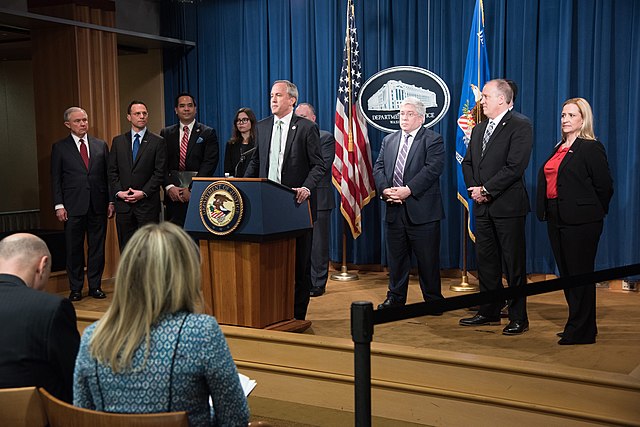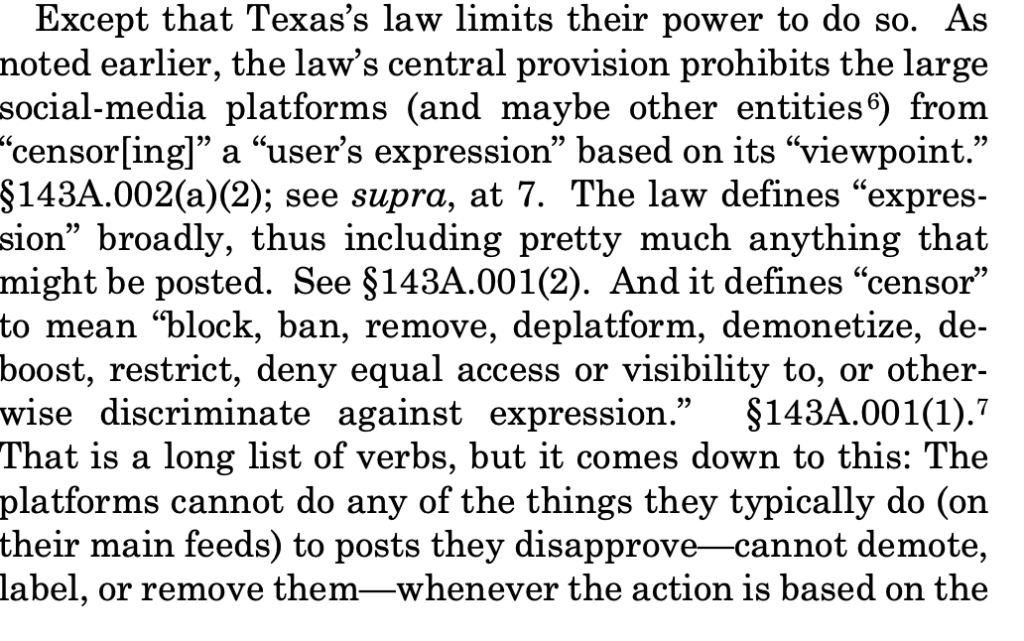Court appears to reject Paxton/DeSantis/TWITTER FILES theory of the First Amendment

In a moment of sanity before announcing that the United States was now a monarchy, while remanding the challenges the Supreme Court strongly suggested that a Florida and Texas laws severely limiting the ability of social media companies to engage in content moderation are unconstitutional in at least most of their applications:
The biggest news out of the Court on Monday, of course, is a sweeping decision holding that former President Donald Trump was effectively allowed to do crimes while he was in office. Indeed, under the six Republican justices’ decision in Trump v. United States, it is very likely that a sitting president can order the military to assassinate his political rivals without facing any criminal consequences for doing so.
Just a few minutes before the Supreme Court handed down its Trump decision, however, it also handed down another case reaffirming that the First Amendment does not permit Republican-led legislatures to seize control of what content is published by media companies. That decision, in Moody v. Netchoice, was 6-3, with three Republican justices who also held that the leader of the Republican Party was allowed to commit many crimes while he was in office joining Justice Elena Kagan’s majority opinion.
So, on the same day that the Supreme Court appears to have established that a sitting president can commit the most horrible crimes imaginable against someone who dares to speak out against him, the same Court — with three justices joining both decisions — holds that the First Amendment still imposes some limits on the government’s ability to control what content appears online.
Chief Justice John Roberts and Justice Brett Kavanaugh joined both decisions in full. Justice Amy Coney Barrett joined the Netchoice opinion in full, plus nearly all of the Trump decision.
[…]
Netchoice concerns two state laws, one from Florida and one from Texas, which seek to control what content must be published by major social media platforms such as Facebook, Twitter, or YouTube. Both laws were enacted by Republican legislatures, and signed by Republican governors, for the very purpose of forcing these platforms to publish right-leaning content that they would prefer not to publish.
As Texas Gov. Greg Abbott said before signing his state’s law, it was enacted to stop an allegedly “dangerous movement by social media companies to silence conservative viewpoints and ideas.”
The two laws, and especially the Texas law, are extraordinarily broad. Texas’s, for example, prohibits major social media companies from moderating content based on “the viewpoint of the user or another person” or on “the viewpoint represented in the user’s expression or another person’s expression.”
That’s such a sweeping restriction on content moderation that it would forbid companies like YouTube or Twitter from removing content that is abusive, that promotes violence, or that seeks to overthrow the United States government. Indeed, Kagan’s opinion includes a bullet-pointed list of eight subject matters that the Texas law would not permit the platforms to moderate, including posts that “support Nazi ideology” or that “encourage teenage suicide and self-injury.”
In any event, Kagan makes clear that this sort of government takeover of social media moderation is not allowed, and she repeatedly rebukes the far-right US Court of Appeals for the Fifth Circuit, which upheld the Texas law.
As Kagan writes, the First Amendment does not permit the government to force platforms “to carry and promote user speech that they would rather discard or downplay.” She also cites several previous Supreme Court decisions that support this proposition, including its “seminal” decision in Miami Herald Publishing Co. v. Tornillo (1974), which held that a newspaper has the right to final control over “the choice of material to go into” it.
Kagan’s list of examples of the content that Texas is trying to force social media companies to platform is worth quoting in full:


If a social media company wants its site to be overrun by Nazis it is free to make that choice, but the First Amendment does not allow the state to require them to make it, and with Kagan’s opinion commanding a majority it would appear that this will remain the law. And to bring the cases of the day full circle, it’s worth noting that these laws were inspired largely by Republican outrage that Trump was temporarily deplatformed when he used social media to try to foment a violent autogolpe.


